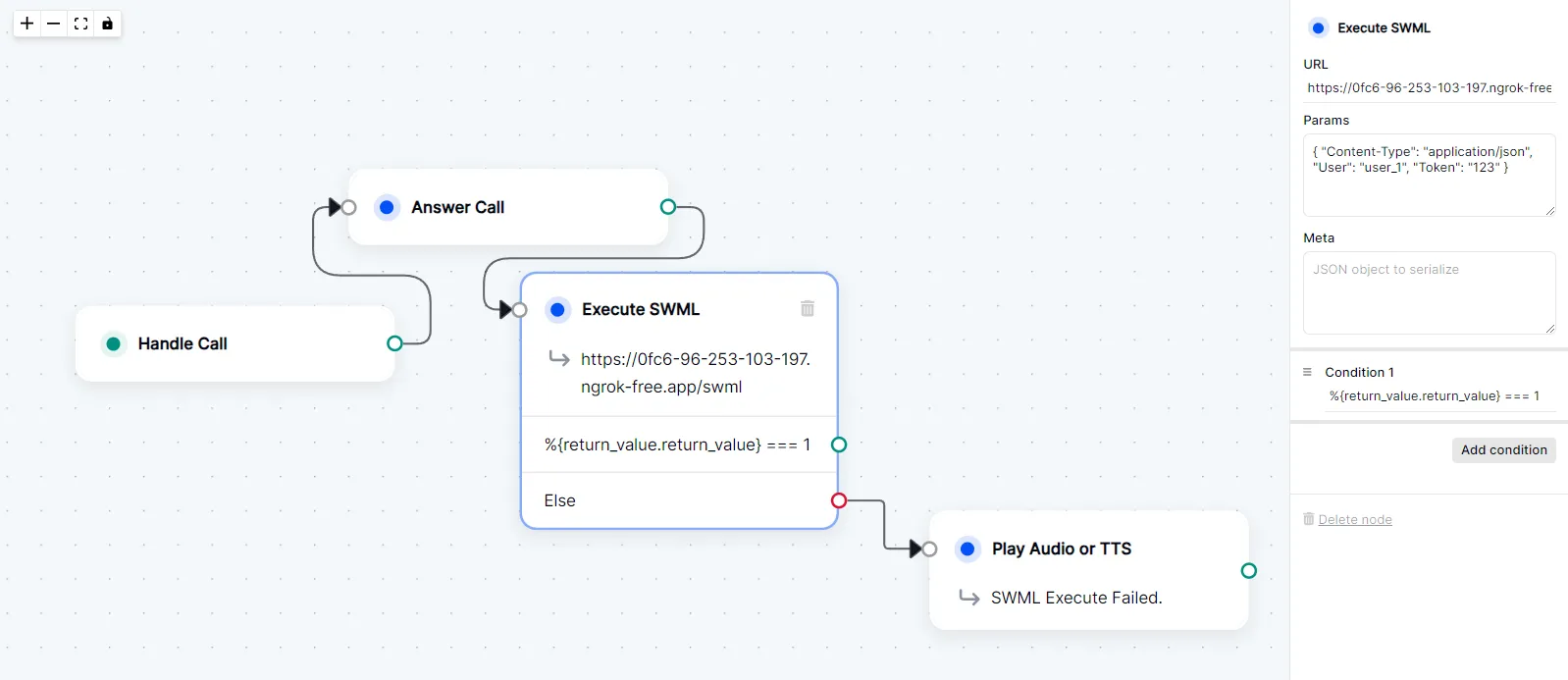Execute SWML
Execute a remote SWML document and return to the current document.
Use %{return_value.['object_field']} to reference the return values from the external SWML.
Output Node Connectors
| Name | Description |
|---|---|
| Condition | The condition that is evaluated to determine which path to take. Additional conditions can be added by clicking the Add condition button. Additional conditions will act as JavaScript else-if statements. |
| Else | The path to take if none of the conditions are met. |
Node Settings
| Node Setting | Description |
|---|---|
| URL | The URL of the SWML document to execute. The URL must return swml in valid JSON or YAML format. |
| Params | The parameters to pass to the SWML document. |
| Meta | The metadata to pass to the SWML document. A JSON object to serialize. |
| Conditions | The conditions that are evaluated to determine which path to take. Additional conditions can be added by clicking the Add condition button. Additional conditions will act as JavaScript else-if statements. |
Example
In this example, we will execute a SWML script that is hosted on a remote server.
When making a request to the server, we will pass the User and Token parameters.
The SWML document will return a JSON object with a play method field.
This play field will be used for TTS (Text-to-Speech) in the current document
and will welcome the user with the User parameter and say the Token parameter.

Call Flow using the Execute SWML node.
Execute SWML Node Settings
- URL: Self-hosted ngrok URL.
- Params:
{ "Content-Type": "application/json", "User": "user_1", "Token": "123" } - Meta: None
- Condition:
%{return_value.return_value} === 1
SWML Document
Below is the SWML document that will be executed.
- YAML
- JSON
sections:
main:
- play: 'say: Hello <USER_NAME>, welcome to the SWML demo! Your token is <TOKEN>!'
{
"sections": {
"main": [
{
"play": "say: Hello <USER_NAME>, welcome to the SWML demo! Your token is <TOKEN>!"
}
]
}
}
Server Code
Below is the server code that will return the SWML document.
- Node.js
- Python
Pre-requisites
const express = require('express');
const ngrok = require('ngrok');
const app = express();
// Body parser middleware to handle JSON payloads
app.use(express.json());
// Define the route
app.post('/swml', (req, res) => {
let reqBody = req.body;
console.log(reqBody);
let user = reqBody.params.User;
let token = reqBody.params.Token;
const swml = {
"sections": {
"main": [
{
"play": `say: Hello ${user}, welcome to the SWML demo! Your token is ${token}!`
}
]
}
};
res.json(swml);
});
// Start the server and use ngrok to expose it
const port = 5000;
app.listen(port, async () => {
const url = await ngrok.connect(port);
console.log(`Server running on ${url}`);
});
Pre-requisites
from flask import Flask, request
from pyngrok import ngrok
app = Flask(__name__)
@app.route('/swml', methods=['POST'])
def swml_route():
# Extracting data from request JSON
req_data = request.json
print(req_data)
user = req_data['params']['User']
token = req_data['params']['Token']
swml = {
"sections": {
"main": [
{
"play": f"say: Hello {user}, welcome to the SWML demo! Your token is {token}!"
}
]
}
}
return swml
if __name__ == "__main__":
port = 5000
public_url = ngrok.connect(port).public_url
print(f" * Running on {public_url}")
app.run(port=port)